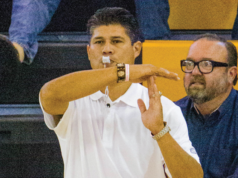On a Thursday evening, you officiate a girls’ varsity match, marked with long skillful rallies. The next night, you work a boys’ contest, frequently punctuated by short powerful bursts. As a referee, how do you adjust mentally as you switch from one type of game to another?
“It takes a very sharp eye, and you have to be ready for anything,” offered Jeff Sears who has worked multiple WI girls’ and boys’ state volleyball tournaments and also officiates USAV and NCAA volleyball.
“Power teams can make for extremely fast action that results in outstanding plays on the ball that you just don’t normally see,” said Sears. “Athletes use all of their bodies to make saves. That means swallowing your whistle at times when you thought for sure the ball was going to be down or out of bounds.”
Sears added, “You have to be very focused, especially when play is fast and powerful, because you have to be ready for anything at all times. As an R2, you have to focus more with the net play and know that there are times the ball will be hitting the floor before players finish their movements and possibly commit net violations.”
Managing people.
Since the R2 is located closer to team benches and in closer contact with coaches, the R2’s communication and game management skills also come into play.
Let’s face it, power teams often play with more intensity. As a result, besides speed and power, you generally can anticipate more reactions from participants after close or controversial calls. To maintain control of the contest, manage situations. Often that requires a different diplomatic approach. How you explain things and relate to people can be the difference between a situation spiraling out of control or the teams moving on to the next rally.
Officials can alleviate problems by working together and using prompt and proper responses to situations. Be alert for trash talk, as well as participants trying to influence your calls. Nip those actions in the bud. A well-timed verbal warning or yellow card can be a very effective remedy.
Helpful advice.
Not long ago, I received some advice from Pati Rolf, an international, college and high school referee, who also chairs the USAV Rules Committee and is a former collegiate coach.
After watching me work as a line judge, she asked, “What kind of athlete are you?”
Taken aback, I wondered what that had to do with officiating.
Sensing confusion, she explained, “You know, we’re all athletes.” She also seemed to have me correctly tabbed as once being an over-achieving type of player who dived a lot and relied on out-hustling, hitting harder and being more committed than the competition.
Her advice to me was:
- Relax.
- Open your mind.
- Let it finish.
I adopted her words as a mantra when taking the court to officiate. I find it especially helpful when confronted with fast, high-level competition.
To me it means:
Relax.
Be calm. Don’t rush. It helps me to slow down, even if the action or a situation is fast-paced.
Open your mind.
Think. See with your eyes wide open. Make conscious decisions, instead of simply reacting. Use and take advantage of all available resources. Visually center with your referee partner to benefit from their discreet signals or assistance.
Communicate constantly.
To better communicate from the referee stand, I make mindful efforts to direct my signals to my partner while making eye contact (versus making signals to the teams or spectators). Use your line judges. Before making a call, take the time and effort to check with them, which is especially important on touches near the net during fast-moving, powerful, vertical play.
Let it finish.
Allow the play to end. Stay with the play all the way through completion. Don’t anticipate the ball will be down, in or out (particularly important with athletic kick saves, lunges and flathanded digs or “pancakes”). Only after the play is completed should you blow it dead. Then, gather information from all crewmembers. Finally, deliberately give the appropriate signal.
If you struggle.
I know a number of officials who do not accept assignments for certain matches. Mainly, they don’t want to put up with attitudes that “take the fun out of the game,” especially when there are more than enough matches available.
Such unwillingness is not good for the sport or the participants. If you find yourself dreading certain assignments, share your concerns with assigners or conference commissioners.
A common cry from coaches is “consistency.” That is what you will most often hear from them during a set or when they are asked what they expect from officials. Put knowledge to practice. Be aware. Be ready. Use proper mechanics and procedures. When it comes to ballhandling, do like a good baseball umpire. Establish an “accurate strike zone” and expectations. Stick with them and be consistent.
Aside from the ball and height of the net — whether girls or boys, power or finesse — volleyball is the same game, with the same rules, and the same court dimensions. But it can involve different types of athletes with varying levels of skill, which require you to adjust.
What's Your Call? Leave a Comment:
Note: This article is archival in nature. Rules, interpretations, mechanics, philosophies and other information may or may not be correct for the current year.
This article is the copyright of ©Referee Enterprises, Inc., and may not be republished in whole or in part online, in print or in any capacity without expressed written permission from Referee. The article is made available for educational use by individuals.



















